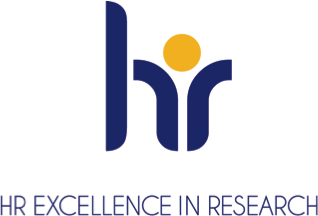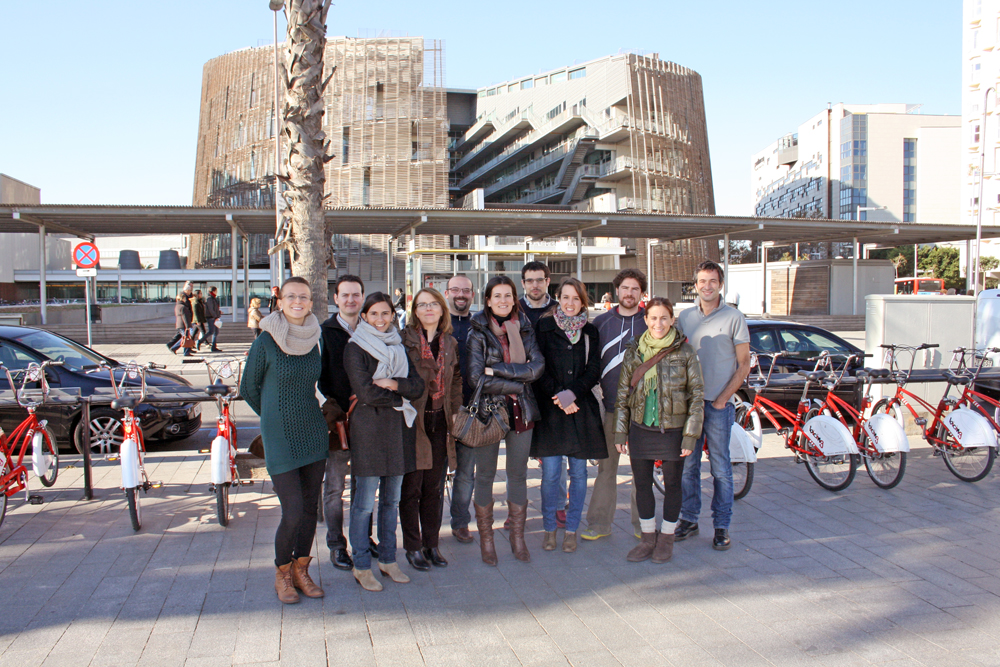 HR Excellence in Research
HR Excellence in Research
 As part of efforts to build a strong research climate in Europe, boost researchers’ career and standardise rights and obligations of researchers across Europe, the European Commission adopted in 2005 a ‘European Charter for Researchers and Code of Conduct for the Recruitment of Researchers (Charter & Code)’, setting out 40 basic principles divided into four areas: ethical and professional aspects, recruitment, working conditions and social security and Training and development.
As part of efforts to build a strong research climate in Europe, boost researchers’ career and standardise rights and obligations of researchers across Europe, the European Commission adopted in 2005 a ‘European Charter for Researchers and Code of Conduct for the Recruitment of Researchers (Charter & Code)’, setting out 40 basic principles divided into four areas: ethical and professional aspects, recruitment, working conditions and social security and Training and development.
The Charter and Code was endorsed by CRG in 2008. Following this commitment, in 2011 CRG accepted an invitation by the European Commission to participate in the HR Strategy for Researchers initiative (third cohort) to make CRG a more attractive workplace for researchers at all levels.
On the 19th of November of 2013, the Centre for Genomic Regulation (CRG) received the 'HR Excellence in Research' logo from the European Commission. This is a recognition of the institute's commitment in developing an HR Strategy for Researchers, designed to bring the practices and procedures in line with the principles of the European Charter for Researchers and the Code of Conduct for the Recruitment of Researchers (Charter and Code).
The HR Excellence in Research seal was renewed in 2021 following a virtual visit from assessors from the European Commission. The award gives public recognition to research institutions that have made progress in aligning their human resource policies with the forty basic principles of the Charter and Code set out by the Commission.
The assessors commended the CRG for its particularly impressive achievements in having an open, transparent and merit-based policy for attracting highly talented researchers from all over the world, as well its efforts in training researchers, its gender equality, the comprehensive welcome services/package, the HR support staff initiatives and the development of a separate professional career policies dedicated to the technicians. The CRG’s Equality, Diversity and Inclusion Plan and its effectiveness in increasing the number of women in team leadership positions, as well as the support for grants targeted at women scientists were two elements that were both highly valued and considered good practices that other research institutions could learn from.
2013-2015 HRS4R Action Plan
The internal gap analysis and action plan were developed in an inclusive and open process involving an internal Working Group with representatives from all research professional categories (see picture). CRG's vision is to recognize researchers and staff as essential contributors to the CRG success by offering a supportive, encouraging and challenging working environment that promotes equal opportunities, ethical integrity and work-life balance.
CRG has adopted an Action Plan 2013-2015 that will enable CRG to fulfill the HR Vision and HR Strategic Objectives in alignment with the European Charter and Code principles.
The Action Plan 2013-2015 highlights are outlined below
- Strengthen the Gender Action Plan at CRG-level with actions ranging from a Coaching Programme for female postdocs to training sessions to address gender bias in recruitment
- Create a Training Unit with a dedicated Training Officer and an annual training plan for all professional categories, including professional skills and career development
- Develop a comprehensive Staff Handbook providing user-friendly information tailored for each professional category
For more information on CRG's HR Strategy, download the PDF

Working team at the CRG
2016-2017 HRS4R Action Plan
The new 2016-2017 Action Plan was designed with the coordination of HR and the support of the HRS4R Monitoring Group (Managing Director, Head of HR and Head of Scientific and International Affairs) and HRS4R Working Group, composed of representatives from each category (Principal Investigators (PIs) /Heads of Unit, Postdocs, PhDs and Technicians).
The 2016-2017 Action Plan was presented and approved by the Executive Board on December 14, 2015.
The main gaps identified focused on the following three areas:
- Implementation of HR policies (recruiting and career development)
- Enhanced promotion of gender balance and work-Iife balance
- Further development of training activities
For more information on the CRG 2016-2017 HRS4R Action Plan download the PDF
2018 HRS4R Midterm Actions
During 2018, the Human Resources Department jointly with the HRS4R Monitoring Group, and the Working Group continued promoting and reinforcing the priorities established in the 2016-2017 Action Plan.
The main midterm actions in 2018 can be summarised as follows:
- Increase awareness in gender bias and continue integrating specific actions in Recruitment, Career Development, Work-Life Balance, Sex-Gender dimension of Research and Management (within Gender Equality Plan – GEP)
- Expand our Training Portfolio, fostering Research Integrity and Responsible Research and Innovation (RRI) learning activities
- Reinforce dissemination of Recruitment Policy and the Principles of the Code of Conduct to the Recruitment of Researchers
2019-2021 HRS4R Action Plan
After the implementation of the two previous action plans, a cross-functional team led by the Human Resources Department, and integrated by a Working Group was set up with the purpose of continue reinforcing the Human Resources Strategy for Researchers (HRS4R) and implementing the Charter & Code in its own policies and practices.
The new Action Plan was shared and discussed with the representatives of the centre as well as key stakeholders, and was adopted by consensus in October 2019 by the Human Resources Department, the members of the Working Group, the Managing Director, the Director, and approved by the Executive Board.
The main strategic lines of action for the 2019-2021 are the following:
- Increase awareness and communication about CRG policies on ethics and good scientific practice, including the dissemination of the CERCA Code of Conduct.
- Reinforce the Open, Transparent and Merit-based Recruitment Policy for Researchers by establishing a mechanism for suggestions and complaints, monitoring quality of the process and creating specific guidelines for panel composition and selection of Group Leaders.
- Promoting equality, diversity and inclusion by designing and implementing an integrative Equality Plan, and executing the LIBRA sustainability plan in collaboration with EU-LIFE partners.
- Further support the talent through career development actions and activities, including mentoring programmes and the design of a comprehensive Training Policy for the Institute.
For more information on CRG's HR Strategy/Action Plan download the PDF.
2022-2024 HRS4R Action Plan
The Remote Visit in 2021 help us to identify our strengths and areas for improvement after being implemented three consequent action plans and having renewed our HR Excellence seal successfully.
According to the report delivered by the European Commission assessors after the Remote Visit and the outcome of our internal gap analysis, the strategic lines of actions to follow in our 2022-2024 Action Plan are the following:
- Raise and increase awareness focused on spreading knowledge and information on research integrity, ethics and good scientific practices.
- Continue fostering recruitment procedures, which are open, efficient, transparent, supportive and internationally comparable by reinforcing procedures, guidance and advertising campaigns.
- Enrich the CRG’s Equality Plan by creating collaboratively among the CRG communities a complementary plan particularly focused on Diversity and Inclusion to advance towards a consolidated culture based on equal opportunities, inclusion, respect for diversity and difference.
- Enhance Health and Well-being by designing and fostering a Framework that covers the areas: workplace relationships, mental health, work-life balance, and health and safety at the workplace.
- Further consolidation of onboarding programme, mentoring programmes and career development activities targeted to each CRG community collaboratively with other institutions and alliances groups, at both level national and international.
For more information on CRG's HR Strategy/Action Plan download the PDF
Human Resources Strategy for Researchers at CRG
The Human Resources Strategy for Researchers (HRS4R) is conceived by the Centre for Genomic Regulation as of a methodology to put the principles of the Charter & Code into practice. To achieve this challenge, the Human Resources Strategy for Researchers (HRS4R) follows a cycle that iterates once the process is completed. The cycle can be described as follows:
- Internal Gap Analysis
- Strategy and Action Plan
- Revision and acknowledgment by the European Commission
- Self-assessment
- External Evaluation by the European Commission
- For further information, please check out the following information provided by the European Commission >> EURAXESS.
Open, Transparent and Merit-based Recruitment Policy
The CRG is committed to an Open, Transparent and Merit-based Recruitment for researchers.
The CRG Recruitment Policy sets out the criteria and procedures for Open, Transparent and Merit-based recruitment of staff, which as a top priority of the European Research Area (ERA), is one of the pillars of the European Charter for Researchers and in particular of the Code of Conduct for the Recruitment of Researchers. This also takes account of current legislation relating to employment, equality and diversity, and data protection. The institute fosters a diverse, inclusive and equal-opportunity environment, and implements several policies to enable CRG staff to achieve an effective balance between work and life outside the workplace.
For further information, please check out our CRG Recruitment Policy for an Open, Transparent and Merit‐based Recruitment of Researchers.
